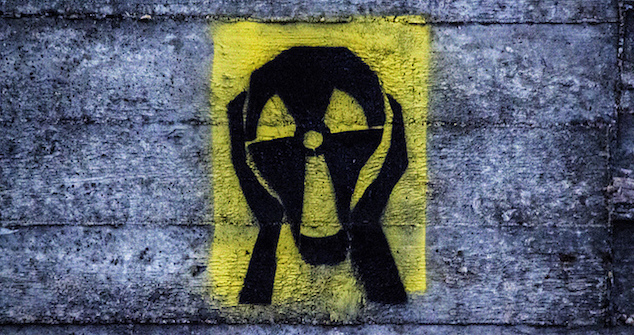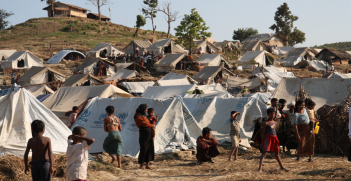Humanitarian Consequences of Nuclear Weapons

More than 100 global leaders have expressed strong support for the Vienna Conference on the humanitarian consequences of nuclear weapons, Ramesh Thakur explains.
In an open letter to Austria’s Foreign Minister Sebastian Kurz on 5 December, more than 120 current and former senior political, military and diplomatic leaders from 46 countries in five continents affirmed strong support for the Vienna Conference on the Humanitarian Impact of Nuclear Weapons and laid out an ambitious agenda for action coming out of the conference.
Signatories to the letter include a former president, six former prime ministers, six former UN under-secretaries-general, a former NATO secretary-general and 36 former foreign and defence ministers. They described the Vienna Conference as an “opportunity for all states, whether they possess nuclear weapons or not, to work together in a joint enterprise to identify, understand, prevent, manage and eliminate the risks associated with these indiscriminate and inhumane weapons”.
From Asia the list of 30 signatories includes three former prime ministers (Malcolm Fraser, Jim Bolger and Sir Geoffrey Palmer), five former defence and foreign ministers (including Gareth Evans and Robert Hill), and two of each former UN under-secretaries-general for disarmament, military chiefs and foreign secretaries.
By any standards, that is an impressive list. The Asian members are particularly concerned because, while all nuclear-armed countries are modernising and upgrading nuclear weapons, our continent is home to the four countries still adding to their nuclear warhead stockpiles (China, India, North Korea and Pakistan). Asia is also considered to be the most likely setting for the next use of nuclear weapons.
Consider, for example, these propositions. First, no one in the world, not even the government of Pakistan, can be confident there will be not be a repeat of the terrorist attack on Mumbai in 2008 with clear links back to Pakistan. Should that happen, no one can be sure that India will not retaliate militarily. If India does conduct a military strike on, or in, Pakistan, no one could be certain that this will not lead to another war. And if India and Pakistan go to war, no one could be confident that it would not quickly escalate to the use of nuclear weapons.
What relevance does the humanitarian impacts initiative have for such a scenario? Simply this: no country in the world individually, nor all of them collectively and with the help of international organisations, can cope with the humanitarian emergency caused by a nuclear war. We just do not have that sort of capacity. All the best calculations show that even a limited regional war between India and Pakistan in which they used just a fraction of their nuclear warheads could wreak havoc in global crop production and food distribution networks, killing up to one billion people around the world.
The letter from global leaders is a joint initiative developed following a recent meeting in Buenos Aires of the Global Networks Forum, the regional leadership networks coordinated by the Washington-based Nuclear Threat Initiative (NTI). In the letter, the leaders “believe it is essential for governments to state emphatically that the use of a nuclear weapon anywhere on the planet would have catastrophic human consequences.” They accordingly call for global efforts (1) to identify and reduce nuclear risks that “are under-estimated or insufficiently understood by world leaders”; (2) raise public awareness; and (3) improve readiness to prepare for the worst – a nuclear incident anywhere around the world.
The leaders comprise a growing global network of voices united to reduce the threat posed by nuclear weapons. The Global Networks Forum includes the Asia Pacific Leadership Network (APLN), the European Leadership Network (ELN), Latin American Leadership Network (LALN) and the North American Nuclear Security Leadership Council (NSLC).
Building on the seminal work of Henry Kissinger, William Perry, Sam Nunn and George Shultz (four heavyweights from the US strategic community with a keen appreciation of the need for strong national defences but also the risks of nuclear weapons) the steps the global leaders propose since 2007 include:
- Improved crisis-management arrangements in conflict hotspots and regions of tension around the world;
- Urgent action to lower the prompt-launch status of existing nuclear stockpiles – Russia and the US hold around 1800 nuclear weapons between them ready to fire within 30 minutes;
- New measures to improve the security of nuclear weapons and nuclear weapons-related materials; and
- Renewed efforts to tackle the increasing threat of proliferation from state and non-state actors.
Awareness of the grave humanitarian consequences of any use of nuclear weapons has been growing steeply. In March 2013 Norway hosted the inaugural conference that was attended by representatives from 127 countries as well as several UN organisations, the Red Cross and civil society. A second conference, hosted by Mexico last February, attracted the participation of 146 countries. It addressed the consequences of any nuclear detonation in areas such as public health, humanitarian assistance, the economy, development and environmental issues, climate change, food security and risk management. The just concluded Vienna Conference (8 – 9 December) was the third in the series, and the first to be attended by two (US, UK) of the five nuclear weapon states (China, France and Russia being the other three) who previously boycotted Oslo and Mexico.
The movement has also gained strength at the United Nations. The almost indescribable horror associated with the use of nuclear weapons informed the very first resolution of the UN General Assembly in 1946, and has been a recurring theme ever since. A UN General Assembly statement on the subject last year was signed by 125 countries. This October, support for the New Zealand-led humanitarian consequences statement had swelled to 155 UN member states. Regrettably, Australia was not among them, once again lagging behind our more progressive cousins across the Tasman.
Professor Ramesh Thakur is Director of the Centre for Nuclear Non-Proliferation and Disarmament and is head of the APLN secretariat, participating in the Buenos Aires meeting of the different global networks.





